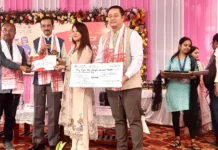NEW DELHI, 9 Jun: With the INDIA bloc parties’ numbers increasing in the 18th Lok Sabha, the Lower House is set to get a Leader of the Opposition (LoP) after 10 ears, and opposition leaders also hope that a deputy speaker will be elected soon, a post that had been vacant for the last five years.
The 17th Lok Sabha, which was dissolved on 5 June, did not have a deputy speaker for its full term, and it was the second consecutive term of the Lower House without an LoP.
All eyes are set on the Lower House, which will get an LoP, and is also expected to have a deputy speaker, a post which usually goes to the opposition ranks.
While the INDIA bloc has not yet held any coordination meeting on its strategy for the Parliament, an opposition leader said that they will mount pressure that the deputy speaker’s post is not left vacant this time.
“The BJP government has been rejected by people. They did not elect any deputy speaker in last five years. Hope they have learnt a lesson and will elect a deputy speaker this time,” a TMC leader said.
The 17th Lok Sabha, in which the BJP was in an absolute majority with 303 seats, elected Om Birla as the speaker. In a first, no deputy speaker was elected through its term of five years.
As per Article 93 of the Constitution, the Lok Sabha shall, as soon as may be, choose two members to be speaker and deputy speaker so often as the offices become vacant. However, it does not provide a specific timeframe.
“The office of the deputy speaker is a constitutional requirement. However, a troubling trend is that legislatures, both national and state, have not filled the office of the deputy speaker. For example, between 2019 and 2024, there was no deputy speaker in the Parliament. The last Rajasthan assembly also did not have a deputy speaker for its full five-year term,” Chakshu Roy, who heads the legislative and civic engagement initiatives at PRS Legislative Research, told PTI.
“Currently, the Jharkhand legislature, whose term is scheduled to end later this year, does not have a deputy speaker,” he said.
“Other than the constitutional requirement, the office of the deputy speaker by convention in the past on multiple occasions has gone to opposition parties. This convention not only strengthens democratic norms but also ensures continuity of the office of speaker, which can never remain vacant,” he said.
In the 16th Lok Sabha, M Thambidurai of the AIADMK was elected as deputy speaker, 70 days after the election results.
Before this, the longest that the Lower House had no deputy speaker was in the 12th Lok Sabha, when the House functioned for 269 days without one since election, data compiled by the PRS shows.
The tenure of the 12th Lok Sabha, led by BJP’s Atal Bihari Vajpayee, lasted only for 13 months, from 10 March, 1998 to 26 April, 1999.
While GMC Balayogi was elected the speaker in the 12th Lok Sabha in March 1998, PM Sayeed of the Congress was elected the deputy speaker only in December that year.
In the ninth Lok Sabha, the term of which started on 2 December, 1989, Rabi Ray was elected the speaker in December 1989, while Shivraj Patil became the deputy speaker in March 1991.
The 18th Lok Sabha will also have an LoP for the first time in 10 years. In the previous two Lok Sabhas, the largest opposition party Congress could not get the post as it did not have the requisite numbers, which is one-tenth of the strength of the House.
In the 16th Lok Sabha, the Congress had 44 MPs, while in the 17th Lok Sabha it had 55.
“Legislative functioning depends not only on the written rules of procedure but also on precedent and convention. The position of the leader of opposition is a critical one in our legislatures,” Roy told PTI.
“Their responsibility is to ensure that the voice of the opposition is effectively conveyed in legislative functioning. The position gives and recognises the opposition has a vital voice contributing to the debate. It is in recognition of this that laws have been made to give the LoP more status and also a position in selection committees of key offices,” he said.
The post of LoP was not recognised till 1969, when Ram Subhag Singh became the first recognised LoP of the Lok Sabha.
The post received statutory recognition through the Salary and Allowances of Leaders of Opposition in Parliament Act, 1977, which defines the term ‘Leader of the Opposition’ as that member of the Lok Sabha or the Rajya Sabha who, for the time being, is the leader of that House of the party in opposition to the government having the greatest numerical strength and recognised, as such, by the chairman of the Rajya Sabha or the speaker of the Lok Sabha.
This time, the leader of the Congress, which is the largest opposition party in the Lok Sabha with 99 MPs, will be recognised as the LoP. (PTI)

